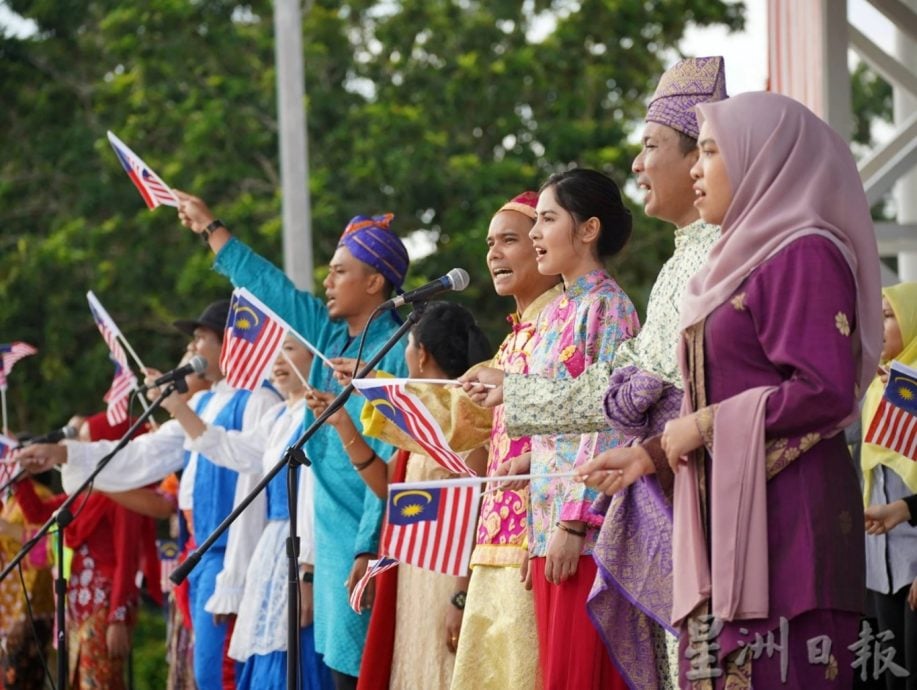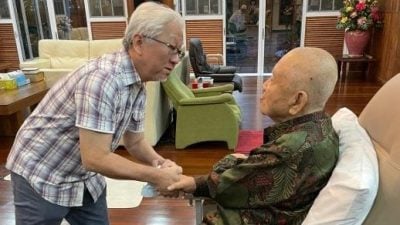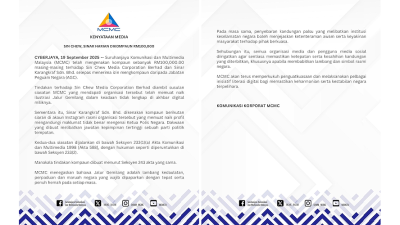
I remember when I was a child taking art classes, our teacher would always ask us to draw the national flag during the National Day month.
Back then, the children might not have accurately sketched the actual design of the Jalur Gemilang, but with great enthusiasm, we poured our patriotic feelings onto the blank paper, each expressing creativity in our own way.
In that moment, the children’s sense of patriotism was quietly awakened. They were bold and full of love for the country. No one would scold them for drawing a flag missing a stripe or a corner.
Their creativity came purely from their heart not from rigid pressure imposed by adults.
Later, the late patriotic singer Sudirman Arshad, during the closing ceremony of the 15th SEA Games in 1989 at the National Stadium, entered the venue wearing an outfit made of the national flag, shouted “Merdeka” three times and sang “To Know Malaysia is to Love Malaysia”, uniting the patriotism of both the audience in stadium and television viewers.
No one accused him of “desecrating” or offending the beloved Jalur Gemilang.
That was the golden era of Malaysia, when people wrote patriotic songs one after another. At the time, love for the country stemmed from heartfelt recognition, not fear of punishment.
In the name of patriotism, we established guidelines for the use of the Jalur Gemilang. While the intention was to guide citizens to respect the national flag, the unintended effect was planting a sense of fear around its use, gradually suppressing people’s natural creativity and enthusiasm.
People now fear that a small mistake in displaying or designing the national flag might lead to irreversible public outrage and punishment. The desire to show patriotism might instead become the spark for disaster.
I believe that patriots would never maliciously insult, burn, desecrate or provocatively display the national flag. But for honest mistakes, we should respond with understanding and compassion, offering the offenders opportunities to learn and rectify—not treating them as treason.
Recently, Malay tabloid Sinar Harian sparked a controversy when it re-used an old design template while creating an infographic for the new Inspector-General of Police, Datuk Seri Mohd Khalid Ismail, and failed to remove outdated information. In the past, media that made such errors would promptly clarify and correct them; if the mistake was severe, they would issue a public apology. The matter would usually settle soon after.
Today, however, the norm is immediate police reports, intense public backlash and investigations that may lead to senior editors being suspended or dismissed. This toxic culture has left media workers living in deep fear and severely undermines the development of press freedom.
Ensuring accuracy and quality contents are the professional duties of journalists. But we are all human—mistakes can happen. Society should give media space to correct, improve, and raise their standards.
Chief editors and senior editorial teams work under tremendous pressure. Every day, they must complete editing and decide within tight deadlines, bearing full responsibility for headlines, texts and images. This pressure is hard for outsiders to comprehend. Only those on the media frontlines understand the stress and intensity of racing against time and managing risk.
In this era where news spreads like bullets, editors must race to publish online content faster than others—like dancing on a knife’s edge. The slightest oversight greatly increases the risk of errors. In a digital world where netizens can screenshot and amplify mistakes in seconds, a single error can become a storm of criticism, with long-lasting consequences.
Fear has quietly crept into our lives and now clings to us like a shadow. What we need is a social atmosphere that tolerates occasional error—not one of frequent public trials or a culture of fear that magnifies every mistake.
Another issue: the government recently issued a directive to all civil servants, strictly prohibiting them from making public statements—spoken or written—that could harm government policies, plans, or decisions. This includes expressing personal views or sharing others’ opinions, all of which would be considered violations.
Civil servants are expected to uphold the principle of “collective responsibility.” Just like in a Cabinet system, if a minister cannot support Cabinet decisions, they should resign. As part of the administrative system, civil servants must also comply with the government’s collective decisions. Their role is to execute policies as directed—not to appear obedient while resisting in private, and certainly not to distort implementation with a “little Napoleon” mentality.
Strictly speaking, the government does not need to issue such directive since “collective responsibility” has been part of the basic rules in the civil service.
But the sudden announcement indicates reasons promoted it. The Pakatan government under Datuk Seri Anwar’s leadership still needs to gain more in-depth support and trust within the administrative system.
To me, front-line civil servants are closer to people and able to explain policies in the languages that the public can understand.
If this directive causes civil servants at all levels to remain silent out of fear—afraid of saying the wrong thing, afraid of being punished for clarifying misunderstandings—the government itself will ultimately suffer.
Oh, at some point, fear has quietly crept into our lives and now clings to us like a shadow.
It makes us live in constant suppression, always worried that a slip of the tongue or an honest mistake could trigger overwhelming condemnation—or even punitive action.
What we need is a social atmosphere that tolerates occasional error—not one of frequent public trials or a culture of fear that magnifies every mistake.
Let’s not allow fear to become the poison that all of us drink. We must not let tolerance, understanding, and empathy become luxuries that are increasingly rare in our society.
ADVERTISEMENT
ADVERTISEMENT








































